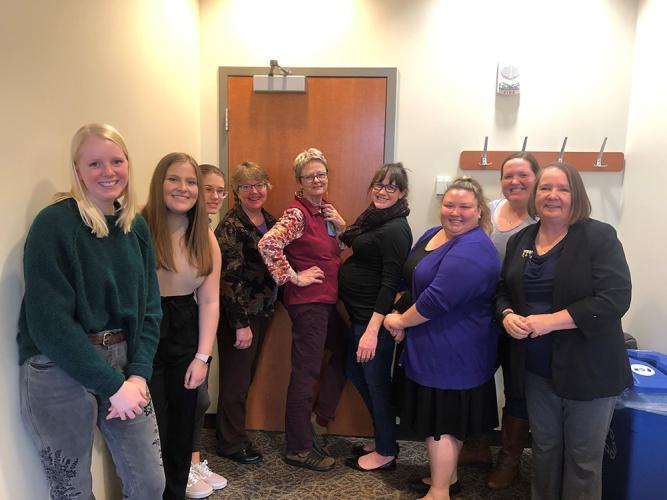
Accessibility Liaisons advocate for students, faculty and staff

As you navigate campus and your community each day you may not think about the importance of accessible buildings, sidewalks, spaces, classes, and more, but some individuals do. Accessibility is an important factor in planning University projects and programs ranging from building renovations to landscaping, from software purchases to study abroad. Input from people living with disabilities can be a critical component of planning and continuous improvement.
At Ohio University the Accessibility Liaisons are a group of faculty, staff, and students including people with disabilities or who have a professional or personal connection to individuals with disabilities. The group serves as an internal resource to the University community and as a partner to the City of Athens Commission on Disabilities.
“The group provides an avenue for feedback and ideas regarding disability and accessibility work for the Office for University Accessibility and other departments as well as a source for understanding the experience and priorities of people with disabilities on our campus,” said Assistant Dean for Accessibility Carey Busch. She explained that the group provides practical and applied expertise which compliments the "technical" expertise of University Accessibility staff.
Evan McAuley, a graduate student in piano performance and pedagogy, serves as an accessibility liaison and said the group represents an opportunity to both reactively and proactively identify and remedy any accessibility barriers that exist for students and faculty on campus. “As a graduate student who did not have a similar place to voice my concerns in my undergraduate studies, it’s very exciting to have this group as a platform to encourage changes in the university’s dialogue, overall accommodations, and student services.”
Now in its fourth year, the Accessibility Liaison group began in the Office of University Equity and Civil Rights Compliance. According to Associate Director for University Accessibility Dianne Bouvier, the group formed partly in response to requests from campus and community leaders for input from people with disabilities to help provide a better understanding of what is important to them with regards to issues such as campus navigation.
“How do we listen to the voices of people with disabilities to make change?” asked Bouvier. “The Accessibility Liaisons group represents one way of making sure the voices of people living with disabilities are part of the discussion.”
The Accessibility Liaisons also consults on issues and projects that represent collaboration between the City of Athens and Ohio University such as sidewalk improvements and parking accessibility.
Bouvier said the University has been able to make some significant changes at the recommendation of the Accessibility Liaisons. One such change was offering a texting option for students requesting rides through Transportation and Parking Services, since phone options rendered the service inaccessible to some OHIO community members. The group has also recommended reducing the use of automatic door closers, which may make doors difficult to open, where not required for safety reasons. According to Bouvier, this makes entrances more accessible and saves money.
“We make better decisions when we include people who are impacted by these decisions,” said Bouvier.
Emma Zgonc, a sociology major in Honors Tutorial College and president of the Ohio University chapter of the College Diabetes Network, said the Accessibility Liaisons group serves as an important and necessary advocate for often overlooked students and staff with various abilities.
“The Accessibility Liaison Group has given me the ability to share my story, as a person with type 1 diabetes, and contribute to a culture of diversity which includes disability around campus,” said Zgonc. “As a student with a ‘hidden’ disability, I have been inspired and empowered to serve alongside faculty and students who share a similar passion for a more accessible campus.”
Also a sociology major in the Honors Tutorial College, accessibility liaison Sydney Borsellino said the group provides a unique perspective of what it means to be a student, faculty member or advisor at Ohio University. Borsellino said, “We have members from all different types of backgrounds, and all different types of capabilities so we are able to share insights on how to make OHIO more accessible.”
The monthly Accessibility Liaisons meetings represent an opportunity for University departments to gather input from students, faculty and staff about how best to support accessibility and inclusion in programming.
At the December Accessibility Liaisons meeting OMSAR Director Dr. Marlene De La Cruz-Guzmán shared information about the programs and services her office provides, and sought input on how to make OMSAR programs, including study abroad opportunities, more accessible for OHIO students. Representatives from the Department of Campus Recreation attended a recent meeting and asked the group about how to make campus recreation programs more accessible to all.
Membership for this group is selected annually, with some members participating over multiple years. Please contact Accessibility Liaisons co-chairs Dianne Bouvier or Christy Jenkins if you are interested in serving as an accessibility liaison or suggesting a potential liaison. The group encourages departments seeking input from persons who understand disability impact in provision of services and programs to reach out to them.
